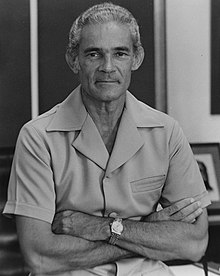Michael Manley
|
The Most Honourable Michael Manley ON OCC |
|
|---|---|
 |
|
| 4th Prime Minister of Jamaica | |
|
In office 2 March 1972 – 1 November 1980 |
|
| Monarch | Elizabeth II |
| Preceded by | Hugh Shearer |
| Succeeded by | Edward Seaga |
|
In office 10 February 1989 – 30 March 1992 |
|
| Preceded by | Edward Seaga |
| Succeeded by | P. J. Patterson |
| Leader of the Opposition | |
|
In office 1969 – 2 March 1972 |
|
| Preceded by | Norman Manley |
| Succeeded by | Hugh Shearer |
|
In office 1 November 1980 – 10 February 1989 |
|
| Preceded by | Edward Seaga |
| Succeeded by | Edward Seaga |
| Personal details | |
| Born |
10 December 1924 Saint Andrew Parish, Jamaica |
| Died | 6 March 1997 (aged 72) Kingston, Jamaica |
| Resting place |
National Heroes Park Kingston, Jamaica |
| Nationality | Jamaica |
| Political party | People's National Party |
| Alma mater | London School of Economics |
| Religion | Roman Catholic |
| Military service | |
| Allegiance |
|
| Service/branch |
|
| Years of service | 1943-1945 |
| Rank | Pilot officer |
| Battles/wars | World War II |
Michael Norman Manley ON OCC (10 December 1924 – 6 March 1997) was a Jamaican politician who served as the fourth Prime Minister of Jamaica from 1972 to 1980 and from 1989 to 1992. Coming from a prosperous background, Manley was a democratic socialist. According to opinion polls, he remains one of Jamaica's most popular Prime Ministers since independence.
Manley, the second son of politician Norman Washington Manley and Edna Manley, attended Jamaica College and then served in the Royal Canadian Air Force during World War II. In 1945, he enrolled at the London School of Economics. He graduated in 1949, and returned to Jamaica to serve as an editor and columnist for the newspaper Public Opinion. At about the same time, he became involved in the trade union movement, becoming a negotiator for the National Workers Union. In August 1953, he became a full-time official of that union.
When his father was elected premier of Jamaica in 1955, Manley resisted entering politics, not wanting to be seen as capitalizing on his family name. However, in 1962 he accepted an appointment to the Senate of the Parliament of Jamaica. He won a very close election to the Jamaican House of Representatives in 1967.
After his father's retirement in 1969, Manley was elected leader of the People's National Party, defeating Vivian Blake. He then served as leader of the Opposition, until his party won in the general elections of 1972.
...
Wikipedia
